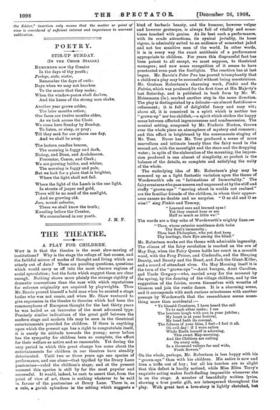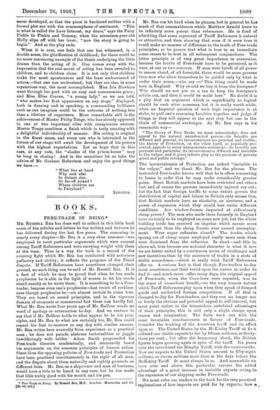THE THEATRE.
A PLAY FOR CHILDREN.
WHY i8 it that the theatre is the most slow-moving of institutions ? Why is the stage the refuge of lost causes, and the faithful mirror of modes of thought and living which are utterly out of date ? These are puzzling questions, questions which would carry us off into the most obscure regions of social speculation ; but the facts which suggest them are clear enough. Nothing shows more plainly the strange rigidity of dramatic conventions than the ease with which reputations for extreme originality are acquired by playwrights. Thus Mr. Barrie proved himself a bold man when he created a stage butler who was not comic, and when Mr. Shaw ventured to give expression in the theatre to theories which had been the commonplaces of European thought for the last thirty years he was hailed as an innovator of the most advanced type. Precisely similar indications of the great gulf between the modern stage and modern life may be seen in the theatrical entertainments provided for children. If there is anything upon which the present age has a right to congratulate itself, it is surely its attitude towards the young ; never before has the sympathy for children been so complete, the effort for their welfare so active and so reasonable. Yet during the very period in which this great change has come about the entertainments for children in our theatres have steadily deteriorated. Until two or three. years ago one species of performance, and one alone—that typified by the Drury Lane pantomime—ruled the children's stage; and at the present moment this species is still by far the most popular and successful. It would, indeed, be rash to assert that, from the point of view of art, there is nothing whatever to be said in favour of the pantomime at Drury Lane. There is, as a rule, a garish • splendour in the -setting which Suggests- a
kind of barbaric beauty, and the humour, however vulgar and however grotesque, is alwaya full of vitality and some- times touched with genius. At its best such a performance, with its crude attractions, its cynical joviality, its loose vigour, is admirably suited to an audience of somewhat jaded and not too sensitive men of the world. In other words, it is in every way the exact antithesis of a performance appropriate to children. For years this disgraceful fact has been patent to all except, we must suppose, to theatrical managers; and now some recognition of it seems to have penetrated even past the footlights. The reaction has at last
begun. Mr. Barrie's Peter Pan has proved triumphantly that a children's play may be successful without being meretricious.
Mr. Graham Robertson's charming work, Pinkie and the Fairies, which was produced for the first time at His Maje9ty's last Saturday, and is published in book form by Mr. W.
Heinemann (Is.), marked another step in the same direction. The play ii distinguished by a delicate—an almost fastidious-- refinement ; it is full of delightful fancy and easy wit; above all, it is conceived in a spirit which is neither too "grown-up" nor too childish,—a spirit which strikes the happy mean between affected ingenuousness and condescension. The musical setting, composed by Mr. Frederic Norton, throws over the whole piece an atmosphere of mystery and romance ; and this effect is heightened by the consummate staging of
Mr. Tree. Never has Mr. Tree produced a scene of more marvellous and intimate beauty than the fairy wood in the
second act, with the moonlight and the stars and the dropping water; in spite of the elaboration of the mounting, the impres- sion produced is one almost of simplicity, so perfect is the balance of the details, so complete and satisfying the unity of the whole.
The underlying idea of Mr. Robertson's play may be summed up as a light fantastic variation upon the theme of Wordsworth's ode on "Intimations of Immortality?' The fairy creatures who pass unseen and unguessed at by the stiff and stuffy "grown-ups" "moving about in worlds not realised" are the familiar friends of the children, in whom their appear-
ance causes no doubts and no surprise. "0 so old and 0 so wise!" sing Pinkie and Tommy,
"Learned ears and learned eyes ! Yet they cannot hear or see Half so much as little we!"
The words are a tiny echo of Wordsworth's mighty lines
"Thou, whose exterior semblance doth belie Thy Soul's immensity ;
Thou best Philospher, who yet dost keep Thy heritage, thou Eye among the blind."
Mr. Robertson works out the theme with admirable ingenuity. The climax of the fairy revelation is reached on the eve of
May Day, when the Fairy Queen holds her court in a moonlit wood, with the Frog Prince, and Cinderella, and the Sleeping Beauty, and Beauty and the Beast, and Jack the Giant-Killer, and a crowd of attendant elves. On May Morning itself it is the turn of the "grown-ups "—Aunt Imogen, Aunt Caroline, and Uncle Gregory—who, carried away for the moment by the spring, by the dancing of the village children, and by the suggestion of the fairies, crown themselves with wreaths of blossom and join the rustic dance. It is a charming scene, and it corresponds with such curious minuteness with another passage by Wordsworth that the resemblance seems some- thing more than accidental :—
" Ye blessM Creatures, I have heard the call
Ye to each other make; I see The heavens laugh with you in your jubilee ; My heart is at your festival, My head hath its corona], The fulness of your bliss, I feel—I feel it all.
Oh evil day ! if I were sullen While Earth herself is adorning, This sweet May-morning, And the Children are culling On every side, In a thousand valleys far and wide, Fresh flowers."
On the whole, perhaps, Mr. Robertson is less happy with his " grown-ups " than with his children. His satire is now and then a trifle out of key ; but all his touches are so slight that this defect is hardly noticed, while Miss Ellen Terry's
exquisite acting makes fault-finding impossible whenever she is on the stage. A number of beautifully written lyrics,
showing a true poetic gift, are interspersed throughout the play. With great tact a love-story is lightly sketched, but
never developed, so that the piece is burdened neither with a formal plot nor with the commonplaces of sentiment. "This
is what is called the Love Interest, my dears," says the Fairy Pickle to Pinkie and Tommy, when the seventeen-year-old Molly slips off with her lover; "now the story is going to
begin." And so the play ends.
When it is over, one feels that one has witnessed, in a double sense, the glorification of childhood; for there could be no more convincing example of the thesis underlying the little drama than the acting of it. One comes away with the impression that the real secret of acting has been revealed to children, and to children alone. It is not only that children make the most spontaneous and the least embarrassed of actors,—that one can understand; but they are also, in some mysterious way, the most accomplished. Miss Iris Hawkins went through her part with an easy and consummate grace ; and Miss Elise Craven, "a young lady," as we are told, "who makes her first appearance on any stage," displayed, both in dancing and in speaking, a commanding brilliance such as one imagines could be the outcome of nothing less than a lifetime of experience. More remarkable still is the achievement of Master Philip Tonge, who has already appeared in one or two important roles with conspicuous success.
Master Tonge combines a finish which is truly amazing with a delightful individuality of manner. His acting is original in the finest sense, and every one who is interested in the future of our stage will await the development of his powers with the highest expectations. Let us hope that in this case, at any rate, the "shades of the prison-house" may be long in closing ! And in the meantime let us take the
advice of Mr. Graham Robertson and enjoy the good things we have:— "What lies at hand Why seek afar In distant star, Or far-off strand ? Where children are Is Fairyland." IGNOTUS.







































 Previous page
Previous page